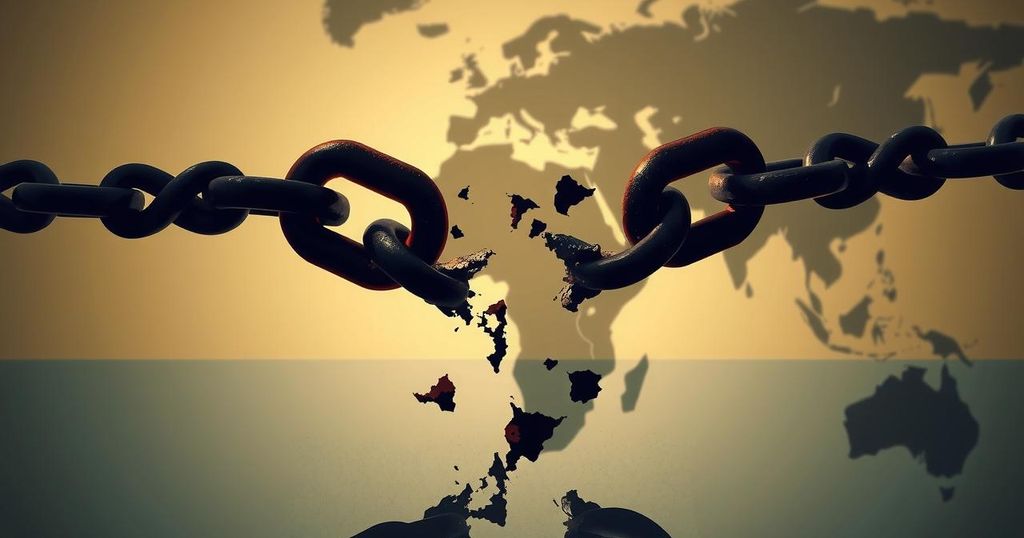United States and Allies Urge Action against Maduro Following Disputed Election
In a recent meeting, U.S. Secretary of State Antony Blinken emphasized the necessity for ongoing international pressure on Venezuelan President Nicolás Maduro to engage with the opposition following a disputed presidential election. His remarks coincide with international concerns over Venezuela’s political repression and human rights violations, amidst an exodus of millions fleeing economic distress. Allies including Argentina joined in calling for accountability and an end to governmental repression.
On Thursday, United States Secretary of State Antony Blinken urged sustained pressure on President Nicolás Maduro of Venezuela to initiate a dialogue with the opposition following the nation’s contested presidential election results. “The regime may try to obscure the results, but the Venezuelan people have spoken,” Mr. Blinken stated during a ministerial meeting focusing on Venezuela, held on the sidelines of the UN General Assembly in New York. He emphasized that efforts must persist to amplify the voices of the Venezuelan populace. Mr. Blinken insisted that there must be a call for Maduro to engage in direct discussions with the united democratic opposition in Venezuela, with the aim of facilitating a peaceful transition back to democracy. This meeting, co-hosted by representatives from both Argentina and the United States, also included officials from the European Union, France, Costa Rica, and Uruguay. Venezuelan President Maduro proclaimed victory in the presidential election held on July 28, despite significant opposition challenges and skepticism from the international community regarding the election’s validity. The government-aligned National Electoral Council (CNE) announced Maduro’s win just after the conclusion of the voting, attributing him 52 percent of the votes while failing to provide detailed electoral data. The opposition, however, has asserted through their own data from polling stations that Edmundo González Urrutia, a retired diplomat, won decisively. In light of an arrest warrant from Venezuela, González Urrutia has sought refuge in Spain, where he has received political asylum. Mr. Blinken further urged for an end to the government’s repression of peaceful protests and political dissent, calling for the unconditional release of all those unjustly imprisoned, including minors. The Biden administration has accused President Maduro of maintaining his hold on power through coercive means, although it has so far refrained from intensifying sanctions against Venezuelan oil. Argentina’s Foreign Minister, Diana Mondino, criticized Maduro’s government, asserting that it is indifferent to the plight of Venezuelans, as evidenced by the exodus of approximately 7.8 million individuals fleeing the country due to severe economic hardship. “They have oil; they have corruption,” she remarked concerning the Maduro regime’s apparent disregard for its citizens’ welfare.
The political landscape in Venezuela remains fraught with tension as the country navigates a multifaceted crisis involving economic instability, political oppression, and human rights violations. Following a controversial presidential election, international observers have raised significant concerns about the management of the electoral process and its implications for democracy in Venezuela. The opposition’s challenges to Maduro’s administration indicate a persistent rift between the government and segments of the population seeking reform amid widespread discontent. Additionally, humanitarian issues, such as the mass displacement of Venezuelans seeking refuge from enduring hardships, heighten international scrutiny of the Maduro government and its policies.
The ongoing discourse surrounding Venezuela’s political turmoil emphasizes the urgent need for international intervention and dialogue. Secretary of State Antony Blinken’s calls to action reflect a shared desire among the United States, Argentina, and other allies to advocate for the rights of the Venezuelan people. The implications of President Maduro’s governance not only affect national stability but also reverberate throughout the region, exacerbating humanitarian crises and necessitating a cooperative approach that addresses the demands for democratic reform in Venezuela.
Original Source: www.batimes.com.ar








Post Comment